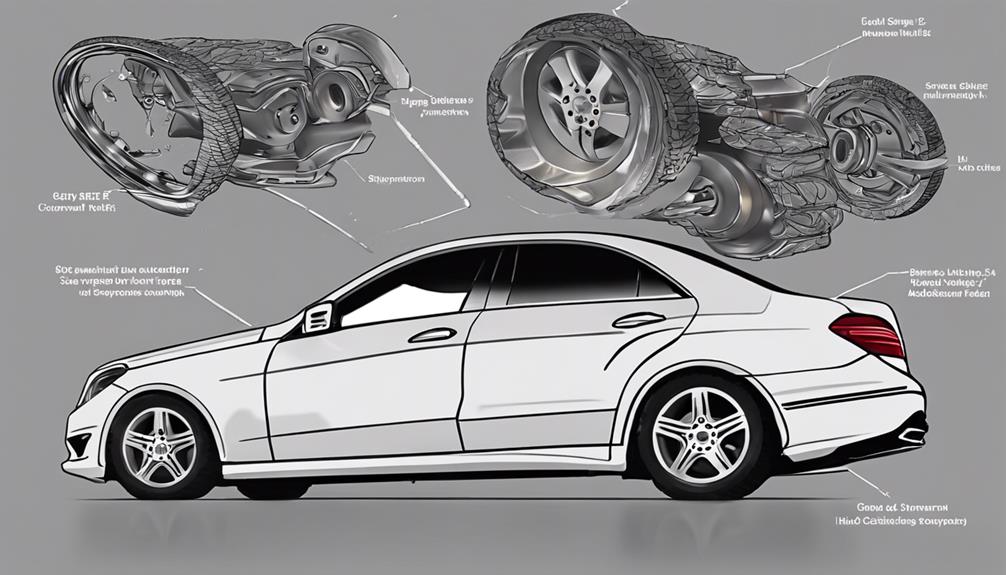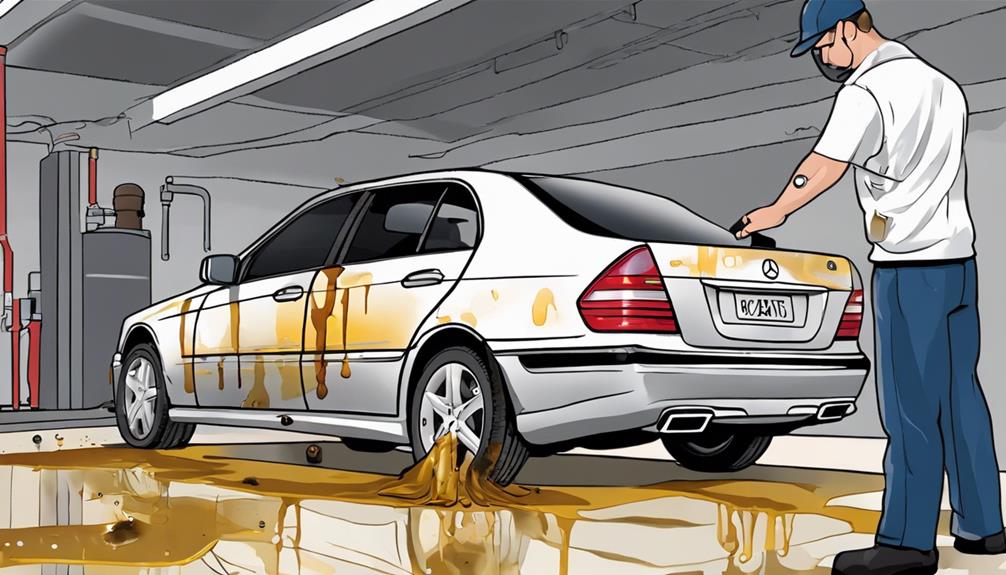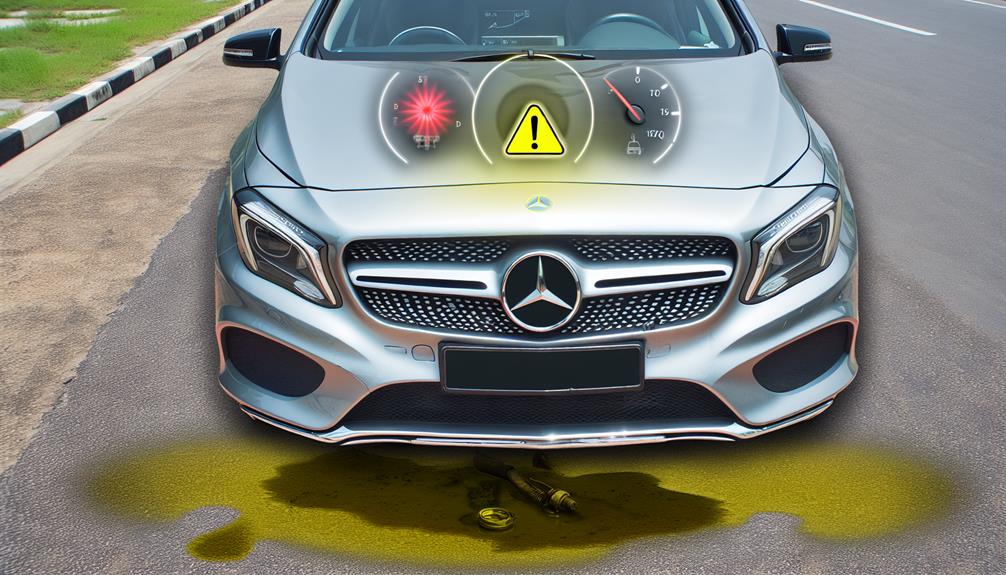Buckle up for the journey of Mercedes E350 ownership! Get ready to navigate through the maze of electrical system malfunctions, facing challenges like faulty door lock actuators and risk of battery drain. Be prepared to tackle transmission issues, from fluid leaks to gear shifting problems. Stay sharp for suspension failures with signs like excessive bouncing and uneven tire wear. Don't overlook engine oil leaks or brake system problems if you want to avoid costly repairs. These are just the tip of the iceberg when it comes to the trials of owning a Mercedes E350.
Key Takeaways
- Electrical system malfunctions like power window issues and keyless entry problems.
- Transmission issues such as gear shifting difficulties and fluid leaks.
- Suspension failures leading to uneven tire wear and excessive bouncing.
- Engine oil leaks from worn-out gaskets or damaged oil seals.
- Brake system problems like premature wear and brake pedal vibrations.
Electrical System Malfunctions

If you've ever experienced frustration with malfunctioning power windows or faulty door lock actuators in your Mercedes E350, you're not alone in facing these common electrical system malfunctions.
The keyless entry system in your E350 is a convenient feature, but issues with door lock actuators can quickly turn this convenience into a headache. When these actuators fail, accessing your vehicle becomes a challenge, leaving you locked out and flustered.
Electrical system malfunctions in the E350 can also manifest in various other ways, such as dashboard malfunctions or lighting issues. These problems not only affect the car's functionality but can also be a source of constant annoyance.
Additionally, the risk of battery drain due to these malfunctions adds another layer of concern for E350 owners. Addressing these electrical issues promptly is crucial to avoid being stranded or facing further complications down the road.
Transmission Issues
If you've noticed your Mercedes E350 experiencing difficulties shifting gears or detect any fluid leaks, it's time to address potential transmission issues.
These problems can stem from various factors like low fluid levels or faulty solenoids, impacting the vehicle's overall performance.
Ensuring timely maintenance checks and swift action can help keep your E350 running smoothly and prevent costly repairs down the road.
Gear Shifting Problems
Frequently encountered in the Mercedes E350 are transmission shifting issues, manifesting as bumpy shifting and reluctance during acceleration. These problems can be aggravating, affecting the overall driving experience. Various factors such as insufficient transmission fluid levels, worn clutches, and faulty solenoids contribute to these gear shifting issues. By adhering to the recommended maintenance schedule for your E350's transmission, you can potentially evade these issues and avoid expensive repairs in the future. Remember, promptly addressing any transmission problems is crucial to uphold the vehicle's performance and durability. Below is a table summarizing common symptoms of gear shifting issues in the Mercedes E350:
| Symptom | Description | Action Needed |
|---|---|---|
| Bumpy Shifting | Jerky gear changes during acceleration | Check fluid levels |
| Reluctance During Acceleration | Delay in changing gears when accelerating | Inspect clutch |
| Struggles to Shift | Difficulty shifting between gears smoothly | Check solenoids |
Fluid Leaks Detected
Detecting and addressing fluid leaks promptly in your Mercedes E350's transmission system is essential to prevent potential shifting issues and maintain peak performance.
Transmission fluid leaks, often caused by worn seals or gaskets, can lead to overheating and premature wear on crucial components. If left unchecked, these leaks may result in costly repairs and decreased driving comfort.
Regularly inspecting your vehicle for oil leaks and monitoring transmission fluid levels can help identify potential issues early on. By promptly addressing any leaks and ensuring the proper level of transmission fluid, you can prolong the lifespan of your Mercedes E350's transmission and enjoy smooth driving experiences.
Stay proactive in maintaining your vehicle to avoid unnecessary complications down the road.
Suspension Failures

If your Mercedes E350 seems to bounce more than usual or you notice uneven tire wear, your suspension system might be giving you trouble. Worn-out shocks, struts, or bushings could be the potential culprits behind your bumpy ride.
Keep an eye out for these signs, and explore repair options to guarantee your E350 maintains its smooth handling on the road.
Causes of Failures
When your Mercedes E350 experiences suspension failures, worn-out shocks, struts, or bushings are often the culprits that lead to these issues. These components play an important role in maintaining stability, comfort, and handling.
Over time, constant road vibrations and impacts can wear down these parts, causing the suspension system to underperform. Common problems like a bumpy ride, uneven tire wear, or unusual noises can indicate issues with these essential elements.
Regularly inspecting and replacing worn-out suspension parts is necessary to prevent more significant failures and guarantee peak performance. By addressing these common problems promptly, you can enhance your E350's ride quality and overall driving experience, keeping you safe and comfortable on the road.
Signs to Watch
Keep an eye out for telltale signs of suspension failures like a rough ride or unusual tire wear patterns on your Mercedes E350. Your suspension system plays an essential role in ensuring a smooth and comfortable driving experience. Here are key signs to watch for:
- Rough Ride: If you start noticing that your Mercedes E350 ride feels bumpier than usual, it could indicate potential suspension issues affecting your ride quality.
- Uneven Tire Wear: Keep an eye on your tire treads for any irregular patterns as they can signal problems with your suspension system that need attention.
- Handling Changes: Any noticeable changes in how your car handles, such as increased body roll or difficulty steering, could be indicative of underlying suspension problems affecting your driving dynamics.
Repair Options Available
Shifting from identifying signs of suspension failures in your Mercedes E350, let's explore the variety of repair options available to address these issues effectively. When dealing with suspension problems, it is crucial to contemplate repair options that can restore your car's smooth ride. Here are some common repair solutions for suspension failures in your Mercedes E350:
| Repair Option | Description |
|---|---|
| Air Suspension Repair | Fixes issues related to air leaks or compressor malfunctions. |
| Shock Absorber Replacement | Replaces worn-out shocks to enhance handling and ride comfort. |
| Strut Replacement | Addresses issues with struts, improving stability and control. |
| Bushing Replacement | Replaces worn bushings to minimize noise and vibrations. |
| Regular Oil Filter Changes | Guarantees proper lubrication and extends suspension component lifespan. |
Engine Oil Leaks

Engine oil leaks in the Mercedes E350 can stem from worn-out gaskets, faulty oil seals, or a damaged oil pan, necessitating prompt attention to prevent potential engine damage. When faced with engine oil leaks, it's important to address them promptly to avoid more significant issues down the road.
- Regular Maintenance: Keeping up with regular maintenance schedules can help detect oil leaks early on, preventing costly repairs or engine damage.
- Inspection: Regularly monitoring oil levels and visually inspecting the engine bay for any signs of leaks can help catch issues before they escalate.
- Professional Assistance: Seeking professional help to replace faulty gaskets or seals is vital in resolving engine oil leaks effectively and preventing further complications.
Brake System Problems
Facing brake system problems in your Mercedes E350 can lead to safety concerns and costly repairs if not addressed promptly and effectively. Issues such as premature brake wear are prevalent, necessitating frequent replacements of brake components.
If you notice brake pedal vibrations during braking, it could signify underlying problems within the brake system that require immediate attention to ensure top-notch performance. ABS system malfunctions have also been reported in Mercedes E350 models, compromising the effectiveness of the anti-lock braking system and potentially putting you at risk.
Additionally, uneven tire wear often correlates with brake system problems, emphasizing the critical importance of maintaining a well-functioning brake system to prevent further damage and ensure your safety on the road.
Keep in mind that tire pressure monitoring system faults may also be linked to underlying brake system issues in your Mercedes E350, so staying vigilant and addressing any brake-related concerns promptly is key to avoiding unnecessary complications.
Fuel System Leaks

Could fuel system leaks in your Mercedes E350 be causing that lingering gas odor after refueling? Addressing this issue promptly is important as fuel leaks from the fuel tank gasket are a common problem in the E350. Here's what you need to know:
- Gas Odor: A strong gas smell after filling up could indicate a fuel system leak, often stemming from the fuel tank gasket.
- Costly Repairs: Replacing the fuel tank gasket due to leaks can set you back around $1,200, making it vital to catch this issue early.
- Preventive Measures: Fuel leaking problems typically arise before hitting 100,000 miles, so regular inspections and maintenance are key to avoiding safety hazards and potential engine damage.
Don't let fuel system leaks dampen your driving experience or compromise your safety. Stay vigilant, address any unusual odors promptly, and keep your Mercedes E350 running smoothly by tackling fuel system leaks head-on.
Airbag Deployment Concerns
Still reeling from the potential fuel system leaks in your Mercedes E350? Brace yourself as we shift focus to the concerning domain of airbag deployment issues plaguing certain models. Airbag deployment problems can turn your smooth drive into a nightmare, with over 200 NHTSA complaints targeting frontal airbag malfunctions in the 2010 E350. Additionally, reports highlight that premature fracture and corrosion in the suspension system are culprits behind these airbag concerns. Models like the 2007 E350 have not been spared either, facing their own set of suspension issues leading to airbag deployment failures. Defective airbags have prompted recalls, emphasizing the critical need for replacement to avert potential safety hazards. The safety risk posed by airbag and suspension failures cannot be overstated, making it imperative for E350 owners to address these issues promptly.
| Airbag Deployment Concerns | ||
|---|---|---|
| Year | Issue | Severity |
| 2010 | Frontal airbag problems | High |
| 2007 | Suspension failures impacting airbags | Medium |
Cooling System Troubles

Experiencing common cooling system troubles in your Mercedes E350 can quickly escalate from minor inconveniences to potentially costly and damaging issues if left unattended. Here are key issues to watch out for:
- Coolant Leaks: Keep an eye out for any signs of coolant leaks, such as puddles under your car or a sweet smell coming from the engine. Addressing these leaks promptly is essential to prevent engine damage and maintain peak performance.
- Overheating Problems: If your Mercedes E350 is frequently overheating, it could indicate underlying issues in the cooling system. Ignoring overheating problems can lead to decreased engine efficiency and potential long-term damage. Be proactive in addressing any overheating issues to keep your vehicle running smoothly.
- Heater Core Failures: Heater core failures not only result in a lack of heat in the cabin but can also lead to coolant leaks. Monitoring the functionality of your heater core is vital for your comfort and the overall health of your Mercedes E350. Regular maintenance and inspections are key to avoiding these cooling system troubles.
Steering Mechanism Failures
If you've ever felt your steering wheel vibrating like it's auditioning for a percussion band, or if you've noticed an unexplained power steering fluid leak akin to an elusive ninja vanishing into thin air, your Mercedes E350 might be hinting at steering mechanism troubles. These symptoms could signal worn-out components in the steering system, such as tie rods, steering rack, or the power steering pump, culprits that can turn your smooth drive into a bumpy ride.
Addressing these issues promptly is like giving your car a much-needed spa day – essential for maintaining control and ensuring your safety on the road.
Steering Wheel Vibrations
When steering wheel vibrations arise in your Mercedes E350, they can serve as important indicators of potential steering mechanism failures, signaling the need for immediate attention and diagnosis. These common problems are essential to address promptly to maintain your vehicle's performance.
Here are three key points to keep in mind:
- Tire Imbalances: Imbalanced tires can cause steering wheel vibrations, impacting the smoothness of your drive.
- Worn-out Suspension Parts: Aging suspension components can lead to vibrations, affecting the stability of your vehicle.
- Power Steering System Issues: Problems with the power steering system may appear as vibrations, requiring a thorough inspection.
Power Steering Fluid Leak
Power steering fluid leaks in your Mercedes E350 can lead to steering mechanism failures, necessitating immediate attention to prevent further damage to the system. Common issues like difficulty steering and low fluid levels indicate a potential leak. These problems often arise from worn-out seals, hoses, or a damaged power steering pump.
Regularly checking fluid levels and addressing leaks promptly can help maintain excellent steering performance and prevent costly repairs down the line. Ignoring these warning signs could result in more severe steering issues, compromising your driving experience and safety.
Stay ahead of common problems by keeping an eye out for leaks and addressing them promptly to ensure your Mercedes E350's steering system remains in top-notch condition.
HVAC System Malfunctions

Facing HVAC system malfunctions in your Mercedes E350 can disrupt your driving experience and compromise the comfort levels inside your vehicle. When it comes to HVAC issues, here are some common problems that may arise:
- Inconsistent Heating or Cooling: Your Mercedes E350 may struggle to maintain the desired temperature due to issues like heater core failures, AC compressor problems, or coolant leaks within the HVAC system.
- Strange Smells and Noises: If you notice unusual odors coming from the vents or hear loud noises from the blower motor, it could signal underlying problems within the HVAC system that need attention.
- Climate Control Faults: Malfunctions in the climate control system can lead to discomfort while driving, affecting not only the temperature inside the vehicle but also the overall driving experience.
Addressing these HVAC system malfunctions promptly is essential to ensure your Mercedes E350 remains a comfortable and functional vehicle for your everyday journeys.
Infotainment System Glitches
Experiencing glitches in the infotainment system of your Mercedes E350 can be a frustrating obstacle to seamless driving and entertainment functionality. Common issues reported by users include frozen screens, unresponsive controls, Bluetooth connectivity problems for phone calls or music streaming, navigation system malfunctions with inaccurate directions or failure to load maps, and intermittent loss of sound from the audio system. To address these common infotainment system glitches, firmware updates may be necessary to fix software bugs causing these issues. Ensuring your Mercedes E350's infotainment system functions properly is essential for an enjoyable driving experience. Below is a table summarizing the common infotainment system glitches encountered by Mercedes E350 owners:
| Common Infotainment System Glitches |
|---|
| Frozen screens or unresponsive controls |
| Bluetooth connectivity issues for calls or music |
| Navigation system malfunctions |
| Intermittent loss of sound |
| Firmware updates may be needed |
Frequently Asked Questions
Is the Mercedes Benz E350 a Reliable Car?
Yes, the Mercedes Benz E350 is a reliable car. It offers a smooth ride, durable build, and consistent performance. With proper care, it can be a trustworthy vehicle for your upscale driving needs, providing comfort and longevity.
What Are the Common Faults of E350?
You'll encounter engine oil leaks from worn gaskets, transmission woes like rough shifting, electrical glitches with power windows, bumpy rides from front suspensions, and heating/cooling troubles with heater cores and AC compressors in the Mercedes E350.
What Is the Best Year for Mercedes E350?
For the best year of Mercedes E350, consider the 2012 model. It's renowned for reliability, boasting a 5/5 J.D. Power rating. In safety tests, the 2008 E350 excelled with a Good rating. The 2012 version was a Top Safety Pick by the IIHS.
How Many Miles Will a Mercedes E350 Last?
Your Mercedes E350, with proper care, can last well over 200,000 miles. Factors like maintenance, driving style, and environment play a role. Regular servicing and addressing issues promptly extend its lifespan. Enjoy the road ahead!
Conclusion
Overall, owning a Mercedes E350 comes with its fair share of common problems. These range from electrical system malfunctions to transmission issues and suspension failures. But fear not, as long as you stay on top of maintenance and address issues promptly, you can continue to enjoy the luxury and comfort that this vehicle has to offer.
Just remember, every car has its quirks, and the E350 is no exception. Stay vigilant, and you'll be cruising smoothly in no time.









